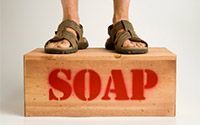19 comments Add a comment
The notion that getting to the year 2000 was the start of a new millennium or that getting to 2010 enters us into a new decade, are both a bunch of badly counted grapes.
If either or both were true, then a great many people are working with incorrect time-keeping pieces, chronometers, clocks and the like. Indeed, these same people must be living their lives out of synch with the real world. They are all turning up for work at least a minute late, and at the same time leaving a minute late. So in their badly timed world, things are evened out and their bosses don't appear to mind.
The passing of time as we generally know it will pass whether we count it or not. But if we choose to measure its passing and mark certain intervals with a point of recognition, festival or celebration, then we should do so correctly, (in good chronological order). For those that think 2000 launched them into a new millennium or that getting to 2010 enters them into a new decade, I have a few simple questions:
Why do the faces of most watches or clocks read 1 to 12/24?
Why do these same time-pieces not have a '0' (zero) before the 1?
Why do western calendars start with day 1 and count to an end date of 28 or 29 or 30 or 31?
When young, why are children taught to read & say '1 O'Clock' through to '12 O'Clock' ?
Where is the 0 O'Clock?
..when you realise time is counted from zero
 The solution to all of the above questions, are helpfully answered, when you realise time is counted from 0, (zero) to a close of 60 seconds, 60 minutes, 12/24 hours, 1 days, etc. But that the 0, (zero) is not part of the measure, merely a point before which is something else. If the beginning of 2000 was the start of a new millennium, why was the first year of the Gregorian calendar, (partially adopted over the Julian calendar at various years/dates) not recorded as year '0'? And why does the year 0 not appear between 1BC and 1AD? (Other than '0' nil or nothing was not widely used as a numeric in that age.) Do you count the seconds off on a watch and record the first minute passed as zero minute? No you don't, you record it as '1' minute and so on till the tenth at '10'; then on to '60' and so on. If you counted the first as zero minute, then the hour would be 59 minutes plus the preceding zero minute. So it is with calendar days, years and so must be with millennia.
The solution to all of the above questions, are helpfully answered, when you realise time is counted from 0, (zero) to a close of 60 seconds, 60 minutes, 12/24 hours, 1 days, etc. But that the 0, (zero) is not part of the measure, merely a point before which is something else. If the beginning of 2000 was the start of a new millennium, why was the first year of the Gregorian calendar, (partially adopted over the Julian calendar at various years/dates) not recorded as year '0'? And why does the year 0 not appear between 1BC and 1AD? (Other than '0' nil or nothing was not widely used as a numeric in that age.) Do you count the seconds off on a watch and record the first minute passed as zero minute? No you don't, you record it as '1' minute and so on till the tenth at '10'; then on to '60' and so on. If you counted the first as zero minute, then the hour would be 59 minutes plus the preceding zero minute. So it is with calendar days, years and so must be with millennia.
If you are one of the many, that believe that 2000 was the start of a new millennium AD or that getting to 2010 enters us into a new decade, then where is the year 0 (zero)? And why do your calendars not register the first day of every month as 0? Is it any wonder that the UK TV licence is so great, when the BBC along with a great mass of other similar deluded souls, celebrated the entrance into the 2nd AD millennia a year early and have gone on to prematurely launch themselves into the 2nd decade of the same. They must all be keeping time, starting with a first minute of every hour being a zero and the 60th being 59. This constant adjustment from the real world to the BBC world, must surely be expensive and dare I say it, 'time consuming'. For all you other like-minded souls, who record time as the BBC does and somehow muddle through life with two time measurements, you have my eternal sympathy.
By: Kryton
Leave a comment
http://en.wikipedia.org/wiki/Julian_calendar
I was in there yesterday and there was a customer really getting hot-tempered, all because they'd run out of HP sauce in glass bottles. I expect he needs to get a job because if this is all he's got to worry about....
Year 1 is likely not year 0. It’s more likely to be many, many years later, in fact. Because after the creation of a working calendar (year 0), it probably took many years before it got accepted in a large enough area that it managed to reach us to this day. So year 1 is more likely to be Year 35 after the creation of the calendar. Or even Year 150. Who knows?
People in the early centuries didn’t have the same tools to count and record dates as we do now. And even if they did, what is to say we got all the records? It’s likely that we are missing a few years here and there.
They weren’t using our modern 365 day calendar either.
And let’s not start on the Leap Years. This is a modern concept. It means that for centuries, we had missing days. That amounts to over a year.
So really, our current date is meaningless. It only serves a purpose to facilitate people living in a society. All the effect the new millennium had, was to create havoc with our time-keeping tools (computers) which were not set up to accept 4 digits. There is no other significance to 2000. Nor to 2001 for that matter.
But hey! It’s nice to have a celebration about *something*!
The concept of zero as a number is attributed to India during the 9th century CE.
It did not reach Europe till the 11th century.
There was no 0 AD. The first year was 1 AD. The year before it was 1 bc.
I prefer formats like the 24-hour clock since it goes from 0 to 59 and 0 to 23.
I always start at 0 where practical.
I am in total agreement with those who say that to complete the 1000 years the millennium commenced on 1 January 2001, just as the new decade will commence on 1 January 2011.
there was me thinking that midnight was 00:00.... I must be wrong






sonny